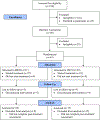Brief Behavioral Treatment for Insomnia vs. Cognitive Behavioral Therapy for Insomnia: Results of a Randomized Noninferiority Clinical Trial Among Veterans
- PMID: 32586428
- PMCID: PMC10352919
- DOI: 10.1016/j.beth.2020.02.002
Brief Behavioral Treatment for Insomnia vs. Cognitive Behavioral Therapy for Insomnia: Results of a Randomized Noninferiority Clinical Trial Among Veterans
Abstract
The goal of this study was to compare a brief behavioral treatment for insomnia (BBTI), which has fewer sessions (4), shorter duration (<30-45 minutes), and delivers treatment in-person plus phone calls to cognitive behavioral therapy for insomnia (CBTI), which has 5 in-person sessions. The hypothesis was BBTI would be noninferior to CBTI. The Reliable Change Index was used to establish a noninferiority margin (NIM) of 3.43, representing the maximum allowable difference between groups on the pre-post Insomnia Severity Index change (ΔISI). Sixty-three veterans with chronic insomnia were randomized to either BBTI or CBTI and veterans in both groups had significant reductions of their insomnia severity per the ISI and improved their sleep onset latency, total wake time, sleep efficiency, and sleep quality per sleep diaries. While CBTI had a larger pre-post ΔISI, this was not significantly different than ΔISI BBTI and was less than the NIM. However, the 95% confidence interval of the between group pre-post ΔISI extended beyond the NIM, and thus BBTI was inconclusively noninferior to CBTI. Limitations, such as small sample size and high rate of dropout, indicate further study is needed to compare brief, alternative yet complementary behavioral insomnia interventions to CBTI. Still, evidence-based brief and flexible treatment options will help to further enhance access to care for veterans with chronic insomnia, especially in non-mental-health settings like primary care.
Trial registration: ClinicalTrials.gov NCT02724800.
Keywords: behavioral therapy; cognitive behavioral therapy; insomnia; noninferiority; veterans.
Copyright © 2020. Published by Elsevier Ltd.
Conflict of interest statement
Conflict of Interest Statement
Dr. Bramoweth has research funding from the Department of Veterans Affairs and receives consulting fees from Noctem, LLC. Dr. Chinman has research funding from the Department of Veterans Affairs and the National Institutes of Health. Dr. Germain has received research funding from the Department of Defense and the National Institutes of Health. She is currently the CEO and Co-founder of Noctem, LLC. The work presented here is not related to Noctem’s commercial interests. Dr. Youk has research funding from the Department of Veterans Affairs and the Chevron Corporation. Mrs. Lederer reports no conflicts of interest.
Figures
Similar articles
-
Survey of Resources in Behavioral Sleep Medicine Across the Department of Defense, Defense Health Agency.Mil Med. 2024 May 18;189(5-6):e1089-e1097. doi: 10.1093/milmed/usad409. Mil Med. 2024. PMID: 37864822
-
A hybrid type I trial to increase Veterans' access to insomnia care: study protocol for a randomized controlled trial.Trials. 2018 Jan 26;19(1):73. doi: 10.1186/s13063-017-2437-y. Trials. 2018. PMID: 29373993 Free PMC article.
-
Brief Behavioral Treatment of Insomnia.Sleep Med Clin. 2019 Jun;14(2):235-243. doi: 10.1016/j.jsmc.2019.02.003. Epub 2019 Apr 1. Sleep Med Clin. 2019. PMID: 31029189 Review.
-
Brief behavioral treatment for insomnia decreases trauma-related nightmare frequency in veterans.J Clin Sleep Med. 2022 Jul 1;18(7):1831-1839. doi: 10.5664/jcsm.10002. J Clin Sleep Med. 2022. PMID: 35393934 Free PMC article. Clinical Trial.
-
Internet-Delivered Cognitive Behavioral Therapy for Insomnia: Tailoring Cognitive Behavioral Therapy for Insomnia for Patients with Chronic Insomnia.Sleep Med Clin. 2020 Jun;15(2):117-131. doi: 10.1016/j.jsmc.2020.02.001. Sleep Med Clin. 2020. PMID: 32386688 Review.
Cited by
-
Implementing brief behavioral treatment for insomnia in Department of Veterans Affairs Primary Care Mental Health Integration clinics: Reach outcomes from a hybrid type 3 effectiveness-implementation trial.Psychol Serv. 2025 Aug;22(3):409-422. doi: 10.1037/ser0000924. Epub 2025 Jan 2. Psychol Serv. 2025. PMID: 39745672
-
Enhancing behavioral sleep care with digital technology: study protocol for a hybrid type 3 implementation-effectiveness randomized trial.Trials. 2021 Jan 11;22(1):46. doi: 10.1186/s13063-020-04974-z. Trials. 2021. PMID: 33430955 Free PMC article.
-
A low-threshold sleep intervention for improving sleep quality and well-being.Front Psychiatry. 2023 Feb 23;14:1117645. doi: 10.3389/fpsyt.2023.1117645. eCollection 2023. Front Psychiatry. 2023. PMID: 36911132 Free PMC article.
-
Evaluation of Implementation Strategies for Cognitive Behavioral Therapy (CBT), Acceptance and Commitment Therapy (ACT), and Mindfulness-Based Stress Reduction (MBSR): a Systematic Review.J Gen Intern Med. 2023 Sep;38(12):2782-2791. doi: 10.1007/s11606-023-08140-4. Epub 2023 Apr 3. J Gen Intern Med. 2023. PMID: 37012538 Free PMC article.
-
Adapting and Evaluating the Feasibility and Acceptability of a Behavioral Intervention to Promote Sleep Health in Cardiac Rehabilitation.Behav Sleep Med. 2024 Nov-Dec;22(6):894-909. doi: 10.1080/15402002.2024.2386602. Epub 2024 Aug 9. Behav Sleep Med. 2024. PMID: 39120442
References
-
- Bootzin RR, & Nicassio PM (1978). Behavioral Treatments for Insomnia. In Hersen M, Eisler RM, & Miller PM (Eds.), Progress in Behavior Modification, Vol. 6. (pp. 1–45). 10.1016/B978-0-12-535606-0.50007-9 - DOI
Publication types
MeSH terms
Associated data
Grants and funding
LinkOut - more resources
Full Text Sources
Other Literature Sources
Medical



